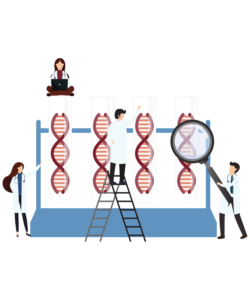Genetic Testing for Rare Diseases: Unlocking the Mysteries
Introduction
Rare disorders, though individually uncommon, affecting a small percentage of the population, collectively impact millions of lives globally.
Diagnosing these conditions has long been a challenge, but genetic testing offers a transformative solution by uncovering the genetic causes behind these disorders, providing patients and their families with answers, clarity, and potential paths forward. This blog explores how genetic testing is transforming the landscape of rare disorder diagnosis, the challenges patients face, and the benefits of integrating genetic insights into healthcare.
What Are Rare Diseases?
Rare disorders are medical conditions that affect fewer than 1 in 2,000 individuals [1]. While each disorder is uncommon, their cumulative impact is substantial, affecting approximately 300 million people globally. However, there are over 7,000 rare diseases. These disorders are often:
 Genetic in origin: Over 80% of rare disorders have a genetic cause [1].
Genetic in origin: Over 80% of rare disorders have a genetic cause [1].- Multisystemic: They can affect multiple organs, making diagnosis challenging.
- Debilitating: Many cause severe disability or are life-threatening.
Challenges in Diagnosing Rare Disorders
Diagnosing rare disorders can take years, a journey often referred to as the “diagnostic odyssey.” Studies show that it takes an average of 5-7 years for patients to receive an accurate diagnosis [2]. During this time, patients may undergo numerous tests, consultations, and even misdiagnoses. Key hurdles include:
- Atypical presentations: Symptoms often overlap with more common conditions, leading to delays in diagnosis.
- Limited awareness: Many providers lack familiarity with rare diseases and the appropriate tests.
- Lack of access: Advanced diagnostic tools like genetic testing are not always readily available, particularly in resource-limited settings.
- Cost Barriers: Tests like WES and WGS can be expensive, and insurance coverage is inconsistent.
- Data Interpretation: Variants of uncertain significance (VUS) pose challenges in understanding results.
Despite these hurdles, advancements in genetic testing now provide a pathway to earlier and more accurate diagnoses, reducing the diagnostic odyssey for many patients.
The Role of Genetic Testing
Genetic testing serves as a cornerstone in diagnosing rare diseases. It involves analyzing DNA, RNA, chromosomes, or proteins to identify genetic mutations that may be responsible for a condition. Here’s how it helps:
- Accurate Diagnosis: For many rare diseases, symptoms overlap with other conditions, making diagnosis challenging. Genetic testing provides definitive answers.
- Early Detection: For hereditary disorders, genetic testing can identify carriers or affected individuals before symptoms appear. Early detection is particularly beneficial for conditions like spinal muscular atrophy (SMA) and certain metabolic disorders, allowing for timely interventions.
- Personalized Treatment Plans: Genetic insights guide targeted treatment plans. For example:
- Precision medicine approaches based on genetic variants.
- Avoidance of triggers for certain disorders (e.g., dietary management for phenylketonuria).
- Family Planning: Testing helps assess risks for future pregnancies and identify carriers within families.
Types of Genetic Testing for Rare Diseases
Several genetic tests are pivotal in diagnosing rare conditions:
- Single-Gene Testing: Used when a specific genetic mutation is suspected based on symptoms (e.g., cystic fibrosis).
- Panel Testing: Examines multiple genes simultaneously, suitable for conditions with overlapping symptoms.
- Whole Exome Sequencing (WES): Focuses on the protein-coding regions of the genome, capturing 85% of known disease-causing mutations [3].
- Whole Genome Sequencing (WGS): Provides a comprehensive analysis of the entire genome, identifying mutations in both coding and non-coding regions.
Benefits of Genetic Testing for Rare Diseases
- Faster Diagnosis: Reduces the diagnostic odyssey—the average time to diagnose a rare disease is over seven years [3].
- Improved Quality of Life: Early diagnosis enables timely interventions, preventing complications.
- Empowering Families: Provides closure and clarity for patients and their loved ones.
While the benefits of genetic testing are undeniable, they come with ethical considerations that must be addressed to ensure responsible implementation.
Ethical Considerations
Genetic testing raises ethical concerns, including:
- Privacy and Discrimination: Ensuring patient data is secure and not used to discriminate in employment or insurance.
- Psychological Impact: Coping with a diagnosis or uncertainty from inconclusive results.
- Reproductive Decisions: Navigating family planning choices based on carrier status or test results.
Future Prospects
The field of genetic testing is rapidly evolving. Advances in technology and research are addressing current limitations:
- Cost Reduction: Sequencing costs have decreased dramatically over the past decade, increasing accessibility.
- Data Sharing Initiatives: Global efforts like the Global Alliance for Genomics and Health promote data sharing to improve rare disease diagnosis.
- Gene Therapy: Understanding genetic mutations paves the way for therapies targeting the root cause of diseases.
The future of genetic testing holds immense promise. By continuing to refine technologies and address ethical concerns, we can ensure more equitable access and improved outcomes for those affected by rare diseases. The journey from mystery to clarity begins with genetic testing, offering a brighter future for patients and families worldwide.
To learn more about how genetic testing can help you or your loved ones, reach out for a consultation. Together, we can unlock the mysteries of rare diseases and pave the way for better health outcomes.
References
The landscape for rare diseases in 2024
The Lancet Global Health, Volume 12, Issue 3, e341- Marwaha, S., Knowles, J.W. & Ashley, E.A. A guide for the diagnosis of rare and undiagnosed disease: beyond the exome. Genome Med 14, 23 (2022). https://doi.org/10.1186/s13073-022-01026-w
- Sudhir Gupta, Leman Yel, 10 – Molecular Biology and Genetic Engineering, Middleton’s Allergy (Eighth Edition), W.B. Saunders, 2014, Pages 162-183, https://doi.org/10.1016/B978-0-323-08593-9.00011-5.
